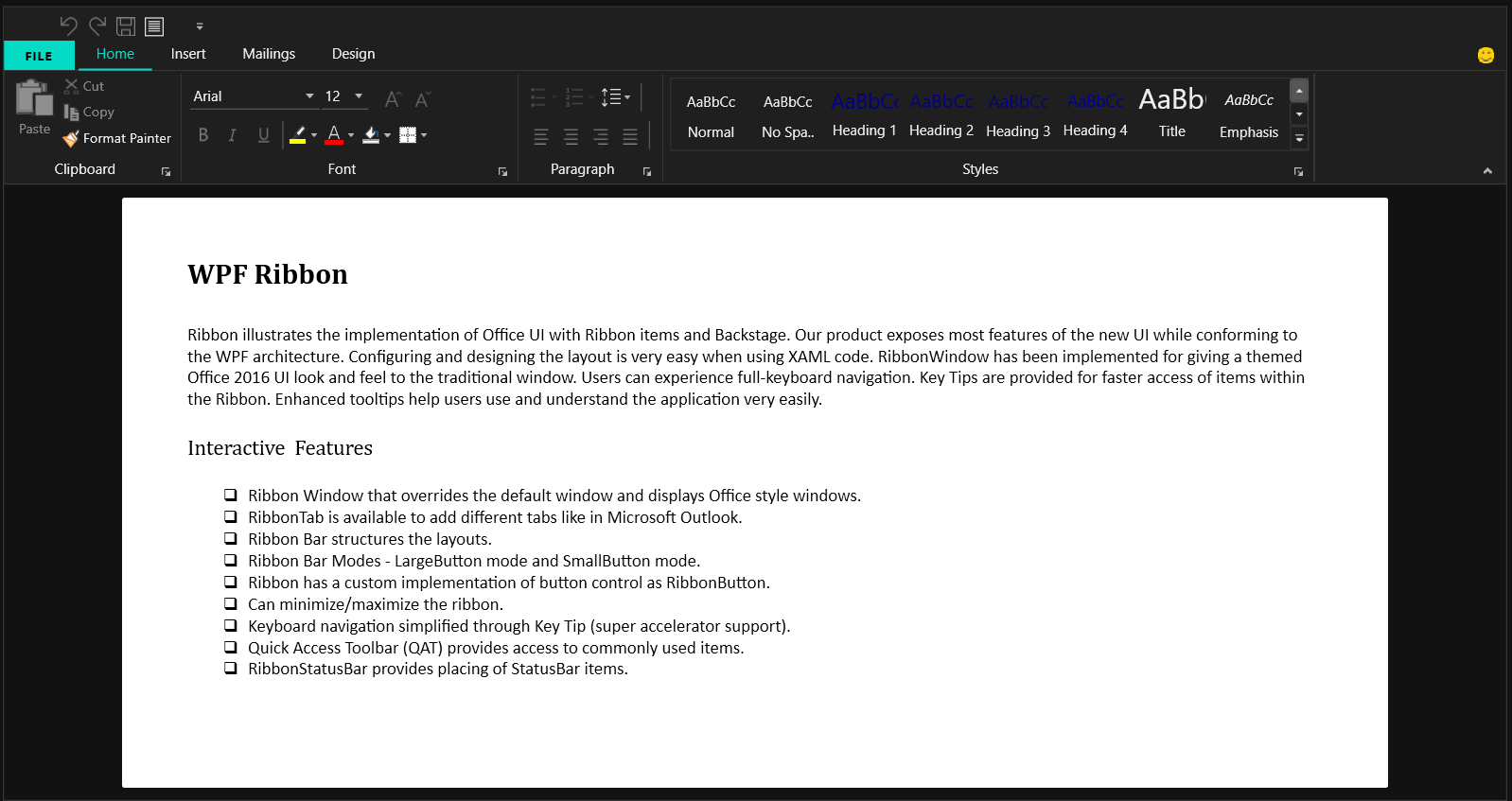How can I help you?
Getting Started with WPF Ribbon
18 Feb 202524 minutes to read
This section explains how to implement a similar UI as Microsoft Outlook using Ribbon.
Add ribbon
There are several ways to add Syncfusion® control in to Visual Studio WPF project, the following steps will helps to add a Ribbon control through XAML Code.
-
Create a WPF project in Visual Studio and refer the following assemblies.
- Syncfusion.Tools.Wpf
- Syncfusion.Shared.Wpf
-
Include an XML namespace for the above assemblies to the Main window.
<Window xmlns="http://schemas.microsoft.com/winfx/2006/xaml/presentation" xmlns:x="http://schemas.microsoft.com/winfx/2006/xaml" xmlns:syncfusion="http://schemas.syncfusion.com/wpf" x:Class="RibbonControl.MainWindow"> </Window> -
Change the Window as
RibbonWindow.<syncfusion:RibbonWindow xmlns="http://schemas.microsoft.com/winfx/2006/xaml/presentation" xmlns:x="http://schemas.microsoft.com/winfx/2006/xaml" xmlns:syncfusion="http://schemas.syncfusion.com/wpf" x:Class="RibbonControl.MainWindow"> </syncfusion:RibbonWindow> -
Add following namespace and inherit MainWindow from
RibbonWindowin code behind.using Syncfusion.Windows.Tools.Controls; public partial class MainWindow : RibbonWindowImports Syncfusion.Windows.Tools.Controls Public class As partial -
Now, Add the Ribbon control with a required optimal name, using the included namespace in XAML.
<syncfusion:RibbonWindow xmlns="http://schemas.microsoft.com/winfx/2006/xaml/presentation" xmlns:x="http://schemas.microsoft.com/winfx/2006/xaml" xmlns:syncfusion="http://schemas.syncfusion.com/wpf" x:Class="RibbonControl.MainWindow"> <Grid> <syncfusion:Ribbon x:Name="_ribbon"/> </Grid> </syncfusion:RibbonWindow>
Set icon for RibbonWindow
-
Icon of the RibbonWindow can be set using the property named
Office2010Icon. Please refer to the below code.<syncfusion:RibbonWindow x:Class="WPFRibbon.MainWindow" xmlns="http://schemas.microsoft.com/winfx/2006/xaml/presentation" xmlns:x="http://schemas.microsoft.com/winfx/2006/xaml" xmlns:d="http://schemas.microsoft.com/expression/blend/2008" xmlns:local="clr-namespace:WPFRibbon" xmlns:mc="http://schemas.openxmlformats.org/markup-compatibility/2006" xmlns:sfSkinManager="clr-namespace:Syncfusion.SfSkinManager;assembly=Syncfusion.SfSkinManager.WPF" xmlns:syncfusion="http://schemas.syncfusion.com/wpf" Title="MainWindow" Office2010Icon="Assets/New Microsoft.png" sfSkinManager:SfSkinManager.VisualStyle="Office2016White" mc:Ignorable="d"> <Grid> <syncfusion:Ribbon x:Name="_ribbon"/> </Grid> </syncfusion:RibbonWindow>
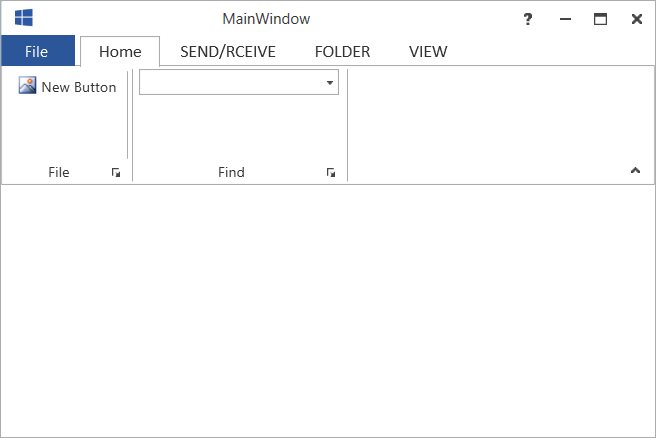
Set visual styles
Ribbon supports various visual styles by using the SfSkinManager. To apply Visual Studio style on the current layout, refer to the following steps.
-
Refer the following assemblies with the project
- Syncfusion.SfSkinManager.Wpf
- Syncfusion.Themes.Office2013White.Wpf
-
Include an XML namespace for the SfSkinManager assembly to the MainWindow.
<syncfusion:RibbonWindow xmlns="http://schemas.microsoft.com/winfx/2006/xaml/presentation" xmlns:x="http://schemas.microsoft.com/winfx/2006/xaml" xmlns:syncfusion="http://schemas.syncfusion.com/wpf" x:Class="RibbonControl.MainWindow" xmlns:syncfusionskin="clr-namespace:Syncfusion.SfSkinManager;assembly=Syncfusion.SfSkinManager.WPF" > <Grid> <syncfusion:Ribbon x:Name="_ribbon"/> </Grid> </syncfusion:RibbonWindow> -
Now apply the value as
Office2013Whiteto theVisualStyleproperty of the SfSkinManager for the RibbonWindow.<syncfusion:RibbonWindow xmlns="http://schemas.microsoft.com/winfx/2006/xaml/presentation" xmlns:x="http://schemas.microsoft.com/winfx/2006/xaml" xmlns:syncfusion="http://schemas.syncfusion.com/wpf" x:Class="RibbonControl.MainWindow" xmlns:syncfusionskin="clr-namespace:Syncfusion.SfSkinManager;assembly=Syncfusion.SfSkinManager.WPF" syncfusionskin:SfSkinManager.VisualStyle="Office2013White" > <Grid> <syncfusion:Ribbon x:Name="_ribbon"/> </Grid> </syncfusion:RibbonWindow>
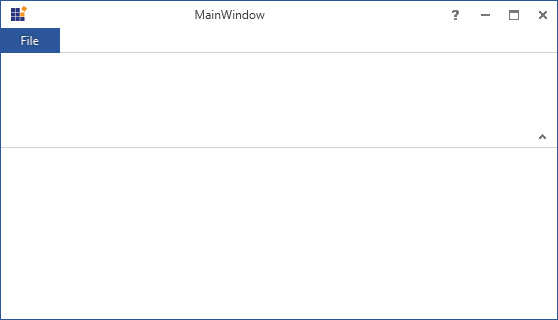
Add RibbonTab
Ribbon control accept RibbonTab as children, Here four RibbonTab are added and that can hold RibbonItems with RibbonBar.
<syncfusion:RibbonWindow
xmlns="http://schemas.microsoft.com/winfx/2006/xaml/presentation"
xmlns:x="http://schemas.microsoft.com/winfx/2006/xaml"
xmlns:syncfusion="http://schemas.syncfusion.com/wpf" x:Class="RibbonControl.MainWindow"
xmlns:syncfusionskin="clr-namespace:Syncfusion.SfSkinManager;assembly=Syncfusion.SfSkinManager.WPF"
syncfusionskin:SfSkinManager.VisualStyle="Office2013White" >
<Grid>
<syncfusion:Ribbon x:Name="_ribbon" VerticalAlignment="Top">
<syncfusion:RibbonTab Caption="HOME" IsChecked="True"/>
<syncfusion:RibbonTab Caption="SEND/RCEIVE" IsChecked="False"/>
<syncfusion:RibbonTab Caption="FOLDER" IsChecked="False"/>
<syncfusion:RibbonTab Caption="VIEW" IsChecked="False"/>
</syncfusion:Ribbon>
</Grid>
</syncfusion:RibbonWindow>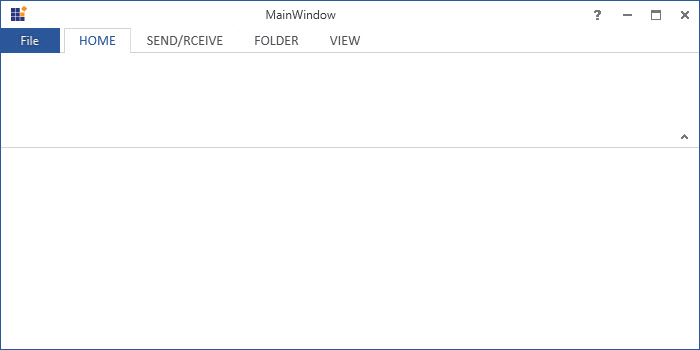
Add RibbonBar
RibbonTab accepts RibbonBar as children, here five RibbonBar Controls are added inside “HOME” RibbonTab. To set header for RibbonBar, use its Header property.
<syncfusion:RibbonWindow
xmlns="http://schemas.microsoft.com/winfx/2006/xaml/presentation"
xmlns:x="http://schemas.microsoft.com/winfx/2006/xaml"
xmlns:syncfusion="http://schemas.syncfusion.com/wpf" x:Class="RibbonControl.MainWindow"
xmlns:syncfusionskin="clr-namespace:Syncfusion.SfSkinManager;assembly=Syncfusion.SfSkinManager.WPF"
syncfusionskin:SfSkinManager.VisualStyle="Office2013White" >
<Grid>
<syncfusion:Ribbon x:Name="_ribbon" VerticalAlignment="Top">
<syncfusion:RibbonTab Caption="HOME" IsChecked="True">
<syncfusion:RibbonBar Name="New" Width="90" Header="New"/>
<syncfusion:RibbonBar Name="Delete" Width="150" Header="Delete"/>
<syncfusion:RibbonBar Name="Respond" Width="90" Header="Respond"/>
<syncfusion:RibbonBar Name="Quicksteps" Width="90" Header="Quick Steps"/>
<syncfusion:RibbonBar Name="Find" Width="90" Header="Find"/>
</syncfusion:RibbonTab>
<syncfusion:RibbonTab Caption="SEND/RCEIVE" IsChecked="False"/>
<syncfusion:RibbonTab Caption="FOLDER" IsChecked="False"/>
<syncfusion:RibbonTab Caption="VIEW" IsChecked="False"/>
</syncfusion:Ribbon>
</Grid>
</syncfusion:RibbonWindow>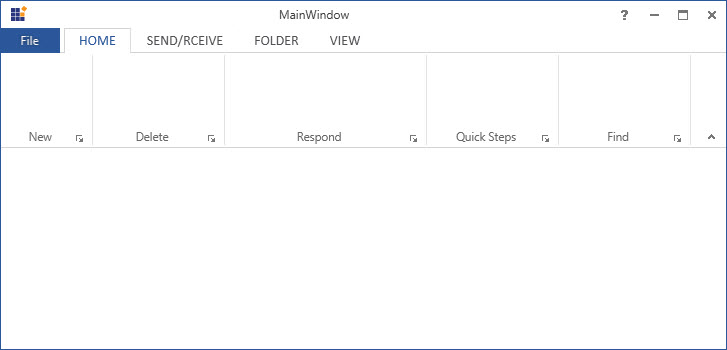
Add RibbonButton
RibbonButton provides functionalities like normal Button. It can place inside the RibbonBar. Here, “New” RibbonBar holds a RibbonButton with a caption as “New Email” using its Label property.It also provides SizeForm property for different sizes.
If the value of SizeForm is large,then image of 16 * 16 size has been expanded to 32 * 32 automatically. Similarly,image of 32 * 32 has been compressed to 16 * 16 if SizeForm is ExtraSmall.
<syncfusion:RibbonBar Name="New" Width="90" Header="New">
<syncfusion:RibbonButton SizeForm="Large" Label="New Email"/>
</syncfusion:RibbonBar>Also add several other Ribbon Button as per the requirement
<syncfusion:RibbonWindow
xmlns="http://schemas.microsoft.com/winfx/2006/xaml/presentation"
xmlns:x="http://schemas.microsoft.com/winfx/2006/xaml"
xmlns:syncfusion="http://schemas.syncfusion.com/wpf" x:Class="RibbonControl.MainWindow"
xmlns:syncfusionskin="clr-namespace:Syncfusion.SfSkinManager;assembly=Syncfusion.SfSkinManager.WPF"
syncfusionskin:SfSkinManager.VisualStyle="Office2013White" >
<Grid>
<syncfusion:Ribbon x:Name="_ribbon" VerticalAlignment="Top">
<syncfusion:RibbonTab Caption="HOME" IsChecked="True">
<syncfusion:RibbonBar Name="New" Width="90" Header="New">
<syncfusion:RibbonButton SizeForm="Large" Label="New Email"/>
</syncfusion:RibbonBar>
<syncfusion:RibbonBar Name="Delete" Width="130" Header="Delete">
<syncfusion:RibbonButton Label="Ignore"/>
<syncfusion:RibbonButton Label="Delete" SizeForm="Large"/>
</syncfusion:RibbonBar>
<syncfusion:RibbonBar Name="Respond" Width="200" Header="Respond">
<syncfusion:RibbonButton Label="Reply" SizeForm="Large"/>
<syncfusion:RibbonButton Label="Reply All" SizeForm="Large"/>
<syncfusion:RibbonButton Label="Forward" SizeForm="Large"/>
<syncfusion:RibbonButton Label="Meeting"/>
</syncfusion:RibbonBar>
<syncfusion:RibbonBar Name="Quicksteps" Width="90" Header="Quick Steps"/>
<syncfusion:RibbonBar Name="Find" Width="90" Header="Find"/>
</syncfusion:RibbonTab>
<syncfusion:RibbonTab Caption="SEND/RCEIVE" IsChecked="False"/>
<syncfusion:RibbonTab Caption="FOLDER" IsChecked="False"/>
<syncfusion:RibbonTab Caption="VIEW" IsChecked="False"/>
</syncfusion:Ribbon>
</Grid>
</syncfusion:RibbonWindow>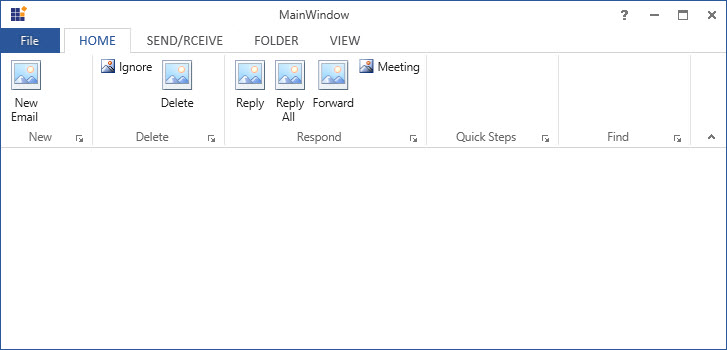
NOTE
Image of any size has been used for
RibbonButtonand also it supports image of all formats.
Add DropDownButton
DropDownButton appears like normal button that contains a drop arrow. It displays some items, while click on it. It accepts DropDownMenuItem as its children. Here, “New” RibbonBar holds a DropDownButton with a caption as “New Items” using its Label property also holding items like “E-mail Message”, “Appointment”, “Meeting”, “Contact” and “Task”. It also provides SizeForm property for different sizes.
<syncfusion:RibbonWindow
xmlns="http://schemas.microsoft.com/winfx/2006/xaml/presentation"
xmlns:x="http://schemas.microsoft.com/winfx/2006/xaml"
xmlns:syncfusion="http://schemas.syncfusion.com/wpf" x:Class="RibbonControl.MainWindow"
xmlns:syncfusionskin="clr-namespace:Syncfusion.SfSkinManager;assembly=Syncfusion.SfSkinManager.WPF"
syncfusionskin:SfSkinManager.VisualStyle="Office2013White" >
<Grid>
<syncfusion:Ribbon x:Name="_ribbon" VerticalAlignment="Top">
<syncfusion:RibbonTab Caption="HOME" IsChecked="True">
<syncfusion:RibbonBar Name="New" Width="90" Header="New">
<syncfusion:RibbonButton SizeForm="Large" Label="New Email"/>
<syncfusion:DropDownButton SizeForm="Large" Label="New Items">
<syncfusion:DropDownMenuItem Header="E-mail Message"/>
<syncfusion:DropDownMenuItem Header="Appointment"/>
<syncfusion:DropDownMenuItem Header="Meeting"/>
<syncfusion:DropDownMenuItem Header="Contact"/>
<syncfusion:DropDownMenuItem Header="Task"/>
</syncfusion:DropDownButton>
</syncfusion:RibbonBar>
<syncfusion:RibbonBar Name="Delete" Width="130" Header="Delete">
<syncfusion:RibbonButton Label="Ignore"/>
<syncfusion:RibbonButton Label="Delete" SizeForm="Large"/>
</syncfusion:RibbonBar>
<syncfusion:RibbonBar Name="Respond" Width="200" Header="Respond">
<syncfusion:RibbonButton Label="Reply" SizeForm="Large"/>
<syncfusion:RibbonButton Label="Reply All" SizeForm="Large"/>
<syncfusion:RibbonButton Label="Forward" SizeForm="Large"/>
<syncfusion:RibbonButton Label="Meeting"/>
</syncfusion:RibbonBar>
<syncfusion:RibbonBar Name="Quicksteps" Width="90" Header="Quick Steps"/>
<syncfusion:RibbonBar Name="Find" Width="90" Header="Find"/>
</syncfusion:RibbonTab>
<syncfusion:RibbonTab Caption="SEND/RCEIVE" IsChecked="False"/>
<syncfusion:RibbonTab Caption="FOLDER" IsChecked="False"/>
<syncfusion:RibbonTab Caption="VIEW" IsChecked="False"/>
</syncfusion:Ribbon>
</Grid>
</syncfusion:RibbonWindow>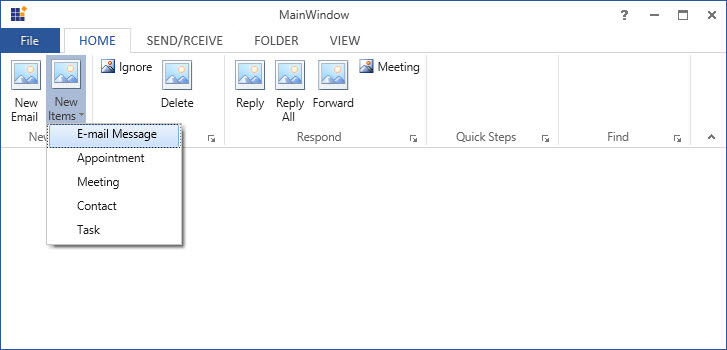
Add SplitButton
SplitButton also appears with a drop arrow. It displays some items while click on it. It accepts DropDownMenuItem as its children. Here, “Delete” RibbonBar holds a SplitButton with a caption as “Clean Up” using its Label property also holding items like “Clean Up Folder”, “Clean Up Conversation” and “Clean Up Folder/SubFolder”. It also provides SizeForm property for different sizes.
<syncfusion:RibbonWindow
xmlns="http://schemas.microsoft.com/winfx/2006/xaml/presentation"
xmlns:x="http://schemas.microsoft.com/winfx/2006/xaml"
xmlns:syncfusion="http://schemas.syncfusion.com/wpf" x:Class="RibbonControl.MainWindow"
xmlns:syncfusionskin="clr-namespace:Syncfusion.SfSkinManager;assembly=Syncfusion.SfSkinManager.WPF"
syncfusionskin:SfSkinManager.VisualStyle="Office2013White" >
<Grid>
<syncfusion:Ribbon x:Name="_ribbon" VerticalAlignment="Top">
<syncfusion:RibbonTab Caption="HOME" IsChecked="True">
<syncfusion:RibbonBar Name="New" Width="90" Header="New">
<syncfusion:RibbonButton SizeForm="Large" Label="New Email"/>
<syncfusion:DropDownButton SizeForm="Large" Label="New Items">
<syncfusion:DropDownMenuItem Header="E-mail Message"/>
<syncfusion:DropDownMenuItem Header="Appointment"/>
<syncfusion:DropDownMenuItem Header="Meeting"/>
<syncfusion:DropDownMenuItem Header="Contact"/>
<syncfusion:DropDownMenuItem Header="Task"/>
</syncfusion:DropDownButton>
</syncfusion:RibbonBar>
<syncfusion:RibbonBar Name="Delete" Width="130" Header="Delete">
<syncfusion:RibbonButton Label="Ignore"/>
<syncfusion:SplitButton Label="Clean Up">
<syncfusion:DropDownMenuItem Header="Clean Up Folder"/>
<syncfusion:DropDownMenuItem Header="Clean Up Conversation"/>
<syncfusion:DropDownMenuItem Header="Clean Up Folder/SubFolder"/>
</syncfusion:SplitButton>
<syncfusion:SplitButton Label="Junk" Margin="0,0,12,0" Width="76"/>
<syncfusion:RibbonButton Label="Delete" SizeForm="Large"/>
</syncfusion:RibbonBar>
<syncfusion:RibbonBar Name="Respond" Width="200" Header="Respond">
<syncfusion:RibbonButton Label="Reply" SizeForm="Large"/>
<syncfusion:RibbonButton Label="Reply All" SizeForm="Large"/>
<syncfusion:RibbonButton Label="Forward" SizeForm="Large"/>
<syncfusion:RibbonButton Label="Meeting"/>
<syncfusion:SplitButton Label="IM" Margin="-2,0,6,0" Width="68"/>
<syncfusion:SplitButton Label="More" Margin="-2,0,6,0" Width="68"/>
</syncfusion:RibbonBar>
<syncfusion:RibbonBar Name="Quicksteps" Width="90" Header="Quick Steps"/>
<syncfusion:RibbonBar Name="Find" Width="90" Header="Find"/>
</syncfusion:RibbonTab>
<syncfusion:RibbonTab Caption="SEND/RCEIVE" IsChecked="False"/>
<syncfusion:RibbonTab Caption="FOLDER" IsChecked="False"/>
<syncfusion:RibbonTab Caption="VIEW" IsChecked="False"/>
</syncfusion:Ribbon>
</Grid>
</syncfusion:RibbonWindow>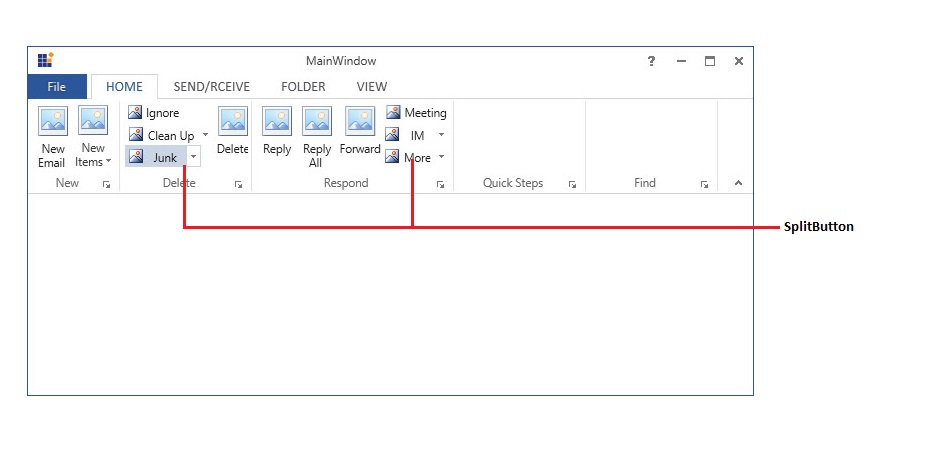
Add RibbonGallery
RibbonGallery displays items with good look and feel and it also used to classify the items as groups for easy navigation. Here, “QuickSteps” RibbonBar holds a RibbonGallery with InRibbon visual mode to place gallery items with in Ribbon. Also ItemHeight, ItemWidth properties are used to set height and width respectively.
<syncfusion:RibbonWindow
xmlns="http://schemas.microsoft.com/winfx/2006/xaml/presentation"
xmlns:x="http://schemas.microsoft.com/winfx/2006/xaml"
xmlns:syncfusion="http://schemas.syncfusion.com/wpf" x:Class="RibbonControl.MainWindow"
xmlns:syncfusionskin="clr-namespace:Syncfusion.SfSkinManager;assembly=Syncfusion.SfSkinManager.WPF"
syncfusionskin:SfSkinManager.VisualStyle="Office2013White" >
<Grid>
<syncfusion:Ribbon x:Name="_ribbon" VerticalAlignment="Top">
<syncfusion:RibbonTab Caption="HOME" IsChecked="True">
<syncfusion:RibbonBar Name="New" Width="90" Header="New">
<syncfusion:RibbonButton SizeForm="Large" Label="New Email"/>
<syncfusion:DropDownButton SizeForm="Large" Label="New Items">
<syncfusion:DropDownMenuItem Header="E-mail Message"/>
<syncfusion:DropDownMenuItem Header="Appointment"/>
<syncfusion:DropDownMenuItem Header="Meeting"/>
<syncfusion:DropDownMenuItem Header="Contact"/>
<syncfusion:DropDownMenuItem Header="Task"/>
</syncfusion:DropDownButton>
</syncfusion:RibbonBar>
<syncfusion:RibbonBar Name="Delete" Width="130" Header="Delete">
<syncfusion:RibbonButton Label="Ignore"/>
<syncfusion:SplitButton Label="Clean Up">
<syncfusion:DropDownMenuItem Header="Clean Up Folder"/>
<syncfusion:DropDownMenuItem Header="Clean Up Conversation"/>
<syncfusion:DropDownMenuItem Header="Clean Up Folder/SubFolder"/>
</syncfusion:SplitButton>
<syncfusion:SplitButton Label="Junk" Margin="0,0,12,0" Width="76"/>
<syncfusion:RibbonButton Label="Delete" SizeForm="Large"/>
</syncfusion:RibbonBar>
<syncfusion:RibbonBar Name="Respond" Width="200" Header="Respond">
<syncfusion:RibbonButton Label="Reply" SizeForm="Large"/>
<syncfusion:RibbonButton Label="Reply All" SizeForm="Large"/>
<syncfusion:RibbonButton Label="Forward" SizeForm="Large"/>
<syncfusion:RibbonButton Label="Meeting"/>
<syncfusion:SplitButton Label="IM" Margin="-2,0,6,0" Width="68"/>
<syncfusion:SplitButton Label="More" Margin="-2,0,6,0" Width="68"/>
</syncfusion:RibbonBar>
<syncfusion:RibbonBar Width="170" Name="QuickSteps" Header="Quick Steps">
<syncfusion:RibbonGallery Width="160" VisualMode="InRibbon" ItemHeight="20" ItemWidth="70">
<syncfusion:RibbonGalleryItem Content="Move to?"/>
<syncfusion:RibbonGalleryItem Content="Team Email"/>
<syncfusion:RibbonGalleryItem Content="ReplyDelete"/>
<syncfusion:RibbonGalleryItem Content="To Manager"/>
<syncfusion:RibbonGalleryItem Content="Done"/>
<syncfusion:RibbonGalleryItem Content="Create New"/>
</syncfusion:RibbonGallery>
</syncfusion:RibbonBar>
<syncfusion:RibbonBar Name="Find" Width="90" Header="Find"/>
</syncfusion:RibbonTab>
<syncfusion:RibbonTab Caption="SEND/RCEIVE" IsChecked="False"/>
<syncfusion:RibbonTab Caption="FOLDER" IsChecked="False"/>
<syncfusion:RibbonTab Caption="VIEW" IsChecked="False"/>
</syncfusion:Ribbon>
</Grid>
</syncfusion:RibbonWindow>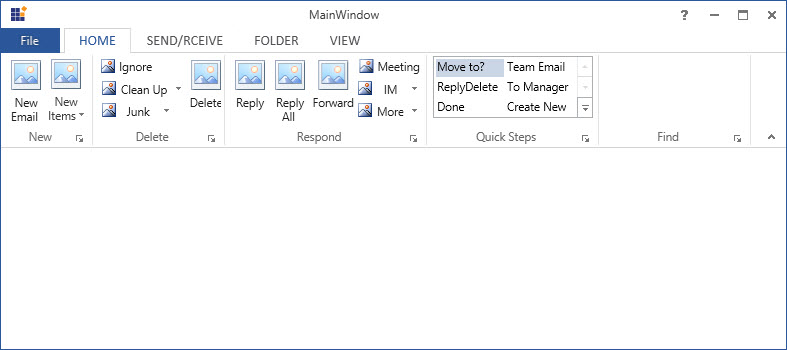
Add RibbonComboBox
RibbonComboBox is used to display the list of items.It accepts ComboBoxItems as its children. Here, “Find” RibbonBar holds a RibbonComboBox with a caption as “Filter Email” using its Label property also holding items like “[email protected]”, “[email protected]” and “[email protected]”.
<syncfusion:RibbonWindow
xmlns="http://schemas.microsoft.com/winfx/2006/xaml/presentation"
xmlns:x="http://schemas.microsoft.com/winfx/2006/xaml"
xmlns:syncfusion="http://schemas.syncfusion.com/wpf" x:Class="RibbonControl.MainWindow"
xmlns:syncfusionskin="clr-namespace:Syncfusion.SfSkinManager;assembly=Syncfusion.SfSkinManager.WPF"
syncfusionskin:SfSkinManager.VisualStyle="Office2013White" >
<Grid>
<syncfusion:Ribbon x:Name="_ribbon" VerticalAlignment="Top">
<syncfusion:RibbonTab Caption="HOME" IsChecked="True">
<syncfusion:RibbonBar Name="New" Width="90" Header="New">
<syncfusion:RibbonButton SizeForm="Large" Label="New Email"/>
<syncfusion:DropDownButton SizeForm="Large" Label="New Items">
<syncfusion:DropDownMenuItem Header="E-mail Message"/>
<syncfusion:DropDownMenuItem Header="Appointment"/>
<syncfusion:DropDownMenuItem Header="Meeting"/>
<syncfusion:DropDownMenuItem Header="Contact"/>
<syncfusion:DropDownMenuItem Header="Task"/>
</syncfusion:DropDownButton>
</syncfusion:RibbonBar>
<syncfusion:RibbonBar Name="Delete" Width="130" Header="Delete">
<syncfusion:RibbonButton Label="Ignore"/>
<syncfusion:SplitButton Label="Clean Up">
<syncfusion:DropDownMenuItem Header="Clean Up Folder"/>
<syncfusion:DropDownMenuItem Header="Clean Up Conversation"/>
<syncfusion:DropDownMenuItem Header="Clean Up Folder/SubFolder"/>
</syncfusion:SplitButton>
<syncfusion:SplitButton Label="Junk" Margin="0,0,12,0" Width="76"/>
<syncfusion:RibbonButton Label="Delete" SizeForm="Large"/>
</syncfusion:RibbonBar>
<syncfusion:RibbonBar Name="Respond" Width="200" Header="Respond">
<syncfusion:RibbonButton Label="Reply" SizeForm="Large"/>
<syncfusion:RibbonButton Label="Reply All" SizeForm="Large"/>
<syncfusion:RibbonButton Label="Forward" SizeForm="Large"/>
<syncfusion:RibbonButton Label="Meeting"/>
<syncfusion:SplitButton Label="IM" Margin="-2,0,6,0" Width="68"/>
<syncfusion:SplitButton Label="More" Margin="-2,0,6,0" Width="68"/>
</syncfusion:RibbonBar>
<syncfusion:RibbonBar Width="170" Name="QuickSteps" Header="Quick Steps">
<syncfusion:RibbonGallery Width="160" VisualMode="InRibbon" ItemHeight="20" ItemWidth="70">
<syncfusion:RibbonGalleryItem Content="Move to?"/>
<syncfusion:RibbonGalleryItem Content="Team Email"/>
<syncfusion:RibbonGalleryItem Content="ReplyDelete"/>
<syncfusion:RibbonGalleryItem Content="To Manager"/>
<syncfusion:RibbonGalleryItem Content="Done"/>
<syncfusion:RibbonGalleryItem Content="Create New"/>
</syncfusion:RibbonGallery>
</syncfusion:RibbonBar>
<syncfusion:RibbonBar Width="170" Header="Find" Name="Find" >
<syncfusion:RibbonComboBox Label="Filter Email" Width="160">
<ComboBoxItem>[email protected]</ComboBoxItem>
<ComboBoxItem>[email protected]</ComboBoxItem>
<ComboBoxItem>[email protected]</ComboBoxItem>
</syncfusion:RibbonComboBox>
</syncfusion:RibbonBar>
</syncfusion:RibbonTab>
<syncfusion:RibbonTab Caption="SEND/RCEIVE" IsChecked="False"/>
<syncfusion:RibbonTab Caption="FOLDER" IsChecked="False"/>
<syncfusion:RibbonTab Caption="VIEW" IsChecked="False"/>
</syncfusion:Ribbon>
</Grid>
</syncfusion:RibbonWindow>Add QAT
QuickAccessToolbar (QAT) is used to group the frequently used commands and access the commands easily without having to search for the command in the menu bar. Also it can be placed above or below the ribbon.
<syncfusion:RibbonWindow
xmlns="http://schemas.microsoft.com/winfx/2006/xaml/presentation"
xmlns:x="http://schemas.microsoft.com/winfx/2006/xaml"
xmlns:syncfusion="http://schemas.syncfusion.com/wpf" x:Class="RibbonControl.MainWindow"
xmlns:syncfusionskin="clr-namespace:Syncfusion.SfSkinManager;assembly=Syncfusion.SfSkinManager.WPF"
syncfusionskin:SfSkinManager.VisualStyle="Office2013White" >
<Grid>
<syncfusion:Ribbon x:Name="_ribbon" VerticalAlignment="Top">
<syncfusion:RibbonTab Caption="HOME" IsChecked="True">
<syncfusion:RibbonBar Name="New" Width="90" Header="New">
<syncfusion:RibbonButton SizeForm="Large" Label="New Email"/>
<syncfusion:DropDownButton SizeForm="Large" Label="New Items">
<syncfusion:DropDownMenuItem Header="E-mail Message"/>
<syncfusion:DropDownMenuItem Header="Appointment"/>
<syncfusion:DropDownMenuItem Header="Meeting"/>
<syncfusion:DropDownMenuItem Header="Contact"/>
<syncfusion:DropDownMenuItem Header="Task"/>
</syncfusion:DropDownButton>
</syncfusion:RibbonBar>
<syncfusion:RibbonBar Name="Delete" Width="130" Header="Delete">
<syncfusion:RibbonButton Label="Ignore"/>
<syncfusion:SplitButton Label="Clean Up">
<syncfusion:DropDownMenuItem Header="Clean Up Folder"/>
<syncfusion:DropDownMenuItem Header="Clean Up Conversation"/>
<syncfusion:DropDownMenuItem Header="Clean Up Folder/SubFolder"/>
</syncfusion:SplitButton>
<syncfusion:SplitButton Label="Junk" Margin="0,0,12,0" Width="76"/>
<syncfusion:RibbonButton Label="Delete" SizeForm="Large"/>
</syncfusion:RibbonBar>
<syncfusion:RibbonBar Name="Respond" Width="200" Header="Respond">
<syncfusion:RibbonButton Label="Reply" SizeForm="Large"/>
<syncfusion:RibbonButton Label="Reply All" SizeForm="Large"/>
<syncfusion:RibbonButton Label="Forward" SizeForm="Large"/>
<syncfusion:RibbonButton Label="Meeting"/>
<syncfusion:SplitButton Label="IM" Margin="-2,0,6,0" Width="68"/>
<syncfusion:SplitButton Label="More" Margin="-2,0,6,0" Width="68"/>
</syncfusion:RibbonBar>
<syncfusion:RibbonBar Width="170" Name="QuickSteps" Header="Quick Steps">
<syncfusion:RibbonGallery Width="160" VisualMode="InRibbon" ItemHeight="20" ItemWidth="70">
<syncfusion:RibbonGalleryItem Content="Move to?"/>
<syncfusion:RibbonGalleryItem Content="Team Email"/>
<syncfusion:RibbonGalleryItem Content="ReplyDelete"/>
<syncfusion:RibbonGalleryItem Content="To Manager"/>
<syncfusion:RibbonGalleryItem Content="Done"/>
<syncfusion:RibbonGalleryItem Content="Create New"/>
</syncfusion:RibbonGallery>
</syncfusion:RibbonBar>
<syncfusion:RibbonBar Width="170" Header="Find" Name="Find" >
<syncfusion:RibbonComboBox Label="Filter Email" Width="160">
<ComboBoxItem>[email protected]</ComboBoxItem>
<ComboBoxItem>[email protected]</ComboBoxItem>
<ComboBoxItem>[email protected]</ComboBoxItem>
</syncfusion:RibbonComboBox>
</syncfusion:RibbonBar>
</syncfusion:RibbonTab>
<syncfusion:RibbonTab Caption="SEND/RCEIVE" IsChecked="False"/>
<syncfusion:RibbonTab Caption="FOLDER" IsChecked="False"/>
<syncfusion:RibbonTab Caption="VIEW" IsChecked="False"/>
<syncfusion:Ribbon.QuickAccessToolBar>
<syncfusion:QuickAccessToolBar/>
</syncfusion:Ribbon.QuickAccessToolBar>
</syncfusion:Ribbon>
</Grid>
</syncfusion:RibbonWindow>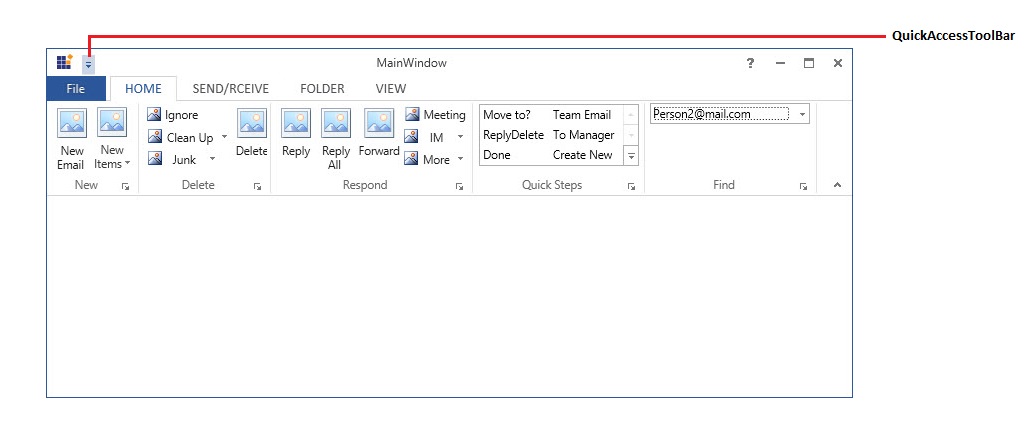
Add items to Quick Access toolbar
QATMenuItems property of QuickAccessToolbar used to add items to Dropdown menu of QAT.
<syncfusion:RibbonWindow
xmlns="http://schemas.microsoft.com/winfx/2006/xaml/presentation"
xmlns:x="http://schemas.microsoft.com/winfx/2006/xaml"
xmlns:syncfusion="http://schemas.syncfusion.com/wpf" x:Class="RibbonControl.MainWindow"
xmlns:syncfusionskin="clr-namespace:Syncfusion.SfSkinManager;assembly=Syncfusion.SfSkinManager.WPF"
syncfusionskin:SfSkinManager.VisualStyle="Office2013White" >
<Grid>
<syncfusion:Ribbon x:Name="_ribbon" VerticalAlignment="Top">
<syncfusion:RibbonTab Caption="HOME" IsChecked="True">
<syncfusion:RibbonBar Name="New" Width="90" Header="New">
<syncfusion:RibbonButton SizeForm="Large" Label="New Email"/>
<syncfusion:DropDownButton SizeForm="Large" Label="New Items">
<syncfusion:DropDownMenuItem Header="E-mail Message"/>
<syncfusion:DropDownMenuItem Header="Appointment"/>
<syncfusion:DropDownMenuItem Header="Meeting"/>
<syncfusion:DropDownMenuItem Header="Contact"/>
<syncfusion:DropDownMenuItem Header="Task"/>
</syncfusion:DropDownButton>
</syncfusion:RibbonBar>
<syncfusion:RibbonBar Name="Delete" Width="130" Header="Delete">
<syncfusion:RibbonButton Label="Ignore"/>
<syncfusion:SplitButton Label="Clean Up">
<syncfusion:DropDownMenuItem Header="Clean Up Folder"/>
<syncfusion:DropDownMenuItem Header="Clean Up Conversation"/>
<syncfusion:DropDownMenuItem Header="Clean Up Folder/SubFolder"/>
</syncfusion:SplitButton>
<syncfusion:SplitButton Label="Junk" Margin="0,0,12,0" Width="76"/>
<syncfusion:RibbonButton Label="Delete" SizeForm="Large"/>
</syncfusion:RibbonBar>
<syncfusion:RibbonBar Name="Respond" Width="200" Header="Respond">
<syncfusion:RibbonButton Label="Reply" SizeForm="Large"/>
<syncfusion:RibbonButton Label="Reply All" SizeForm="Large"/>
<syncfusion:RibbonButton Label="Forward" SizeForm="Large"/>
<syncfusion:RibbonButton Label="Meeting"/>
<syncfusion:SplitButton Label="IM" Margin="-2,0,6,0" Width="68"/>
<syncfusion:SplitButton Label="More" Margin="-2,0,6,0" Width="68"/>
</syncfusion:RibbonBar>
<syncfusion:RibbonBar Width="170" Name="QuickSteps" Header="Quick Steps">
<syncfusion:RibbonGallery Width="160" VisualMode="InRibbon" ItemHeight="20" ItemWidth="70">
<syncfusion:RibbonGalleryItem Content="Move to?"/>
<syncfusion:RibbonGalleryItem Content="Team Email"/>
<syncfusion:RibbonGalleryItem Content="ReplyDelete"/>
<syncfusion:RibbonGalleryItem Content="To Manager"/>
<syncfusion:RibbonGalleryItem Content="Done"/>
<syncfusion:RibbonGalleryItem Content="Create New"/>
</syncfusion:RibbonGallery>
</syncfusion:RibbonBar>
<syncfusion:RibbonBar Width="170" Header="Find" Name="Find" >
<syncfusion:RibbonComboBox Label="Filter Email" Width="160">
<ComboBoxItem>[email protected]</ComboBoxItem>
<ComboBoxItem>[email protected]</ComboBoxItem>
<ComboBoxItem>[email protected]</ComboBoxItem>
</syncfusion:RibbonComboBox>
</syncfusion:RibbonBar>
</syncfusion:RibbonTab>
<syncfusion:RibbonTab Caption="SEND/RCEIVE" IsChecked="False"/>
<syncfusion:RibbonTab Caption="FOLDER" IsChecked="False"/>
<syncfusion:RibbonTab Caption="VIEW" IsChecked="False"/>
<syncfusion:Ribbon.QuickAccessToolBar>
<syncfusion:QuickAccessToolBar>
<syncfusion:RibbonButton SizeForm="ExtraSmall"/>
<syncfusion:RibbonButton SizeForm="ExtraSmall"/>
<syncfusion:QuickAccessToolBar.QATMenuItems>
<syncfusion:RibbonButton Label="Send" />
<syncfusion:RibbonButton Label="Forward" />
<syncfusion:RibbonButton Label="ReplyAll" />
<syncfusion:RibbonButton Label="Delete" />
<syncfusion:RibbonButton Label="Print" />
</syncfusion:QuickAccessToolBar.QATMenuItems>
</syncfusion:QuickAccessToolBar>
</syncfusion:Ribbon.QuickAccessToolBar>
</syncfusion:Ribbon>
</Grid>
</syncfusion:RibbonWindow>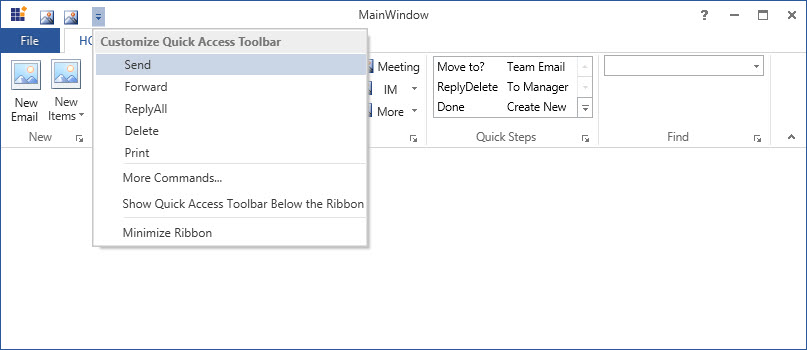
Add BackStage
BackStage can be added by using BackStage property of Ribbon. To show the BackStage by, click the FILE Menu in Ribbon like in Microsoft Outlook.
<syncfusion:RibbonWindow
xmlns="http://schemas.microsoft.com/winfx/2006/xaml/presentation"
xmlns:x="http://schemas.microsoft.com/winfx/2006/xaml"
xmlns:syncfusion="http://schemas.syncfusion.com/wpf" x:Class="RibbonControl.MainWindow"
xmlns:syncfusionskin="clr-namespace:Syncfusion.SfSkinManager;assembly=Syncfusion.SfSkinManager.WPF"
syncfusionskin:SfSkinManager.VisualStyle="Office2013White" >
<Grid>
<syncfusion:Ribbon x:Name="_ribbon" VerticalAlignment="Top">
<syncfusion:RibbonTab Caption="HOME" IsChecked="True">
<syncfusion:RibbonBar Name="New" Width="90" Header="New">
<syncfusion:RibbonButton SizeForm="Large" Label="New Email"/>
<syncfusion:DropDownButton SizeForm="Large" Label="New Items">
<syncfusion:DropDownMenuItem Header="E-mail Message"/>
<syncfusion:DropDownMenuItem Header="Appointment"/>
<syncfusion:DropDownMenuItem Header="Meeting"/>
<syncfusion:DropDownMenuItem Header="Contact"/>
<syncfusion:DropDownMenuItem Header="Task"/>
</syncfusion:DropDownButton>
</syncfusion:RibbonBar>
<syncfusion:RibbonBar Name="Delete" Width="130" Header="Delete">
<syncfusion:RibbonButton Label="Ignore"/>
<syncfusion:SplitButton Label="Clean Up">
<syncfusion:DropDownMenuItem Header="Clean Up Folder"/>
<syncfusion:DropDownMenuItem Header="Clean Up Conversation"/>
<syncfusion:DropDownMenuItem Header="Clean Up Folder/SubFolder"/>
</syncfusion:SplitButton>
<syncfusion:SplitButton Label="Junk" Margin="0,0,12,0" Width="76"/>
<syncfusion:RibbonButton Label="Delete" SizeForm="Large"/>
</syncfusion:RibbonBar>
<syncfusion:RibbonBar Name="Respond" Width="200" Header="Respond">
<syncfusion:RibbonButton Label="Reply" SizeForm="Large"/>
<syncfusion:RibbonButton Label="Reply All" SizeForm="Large"/>
<syncfusion:RibbonButton Label="Forward" SizeForm="Large"/>
<syncfusion:RibbonButton Label="Meeting"/>
<syncfusion:SplitButton Label="IM" Margin="-2,0,6,0" Width="68"/>
<syncfusion:SplitButton Label="More" Margin="-2,0,6,0" Width="68"/>
</syncfusion:RibbonBar>
<syncfusion:RibbonBar Width="170" Name="QuickSteps" Header="Quick Steps">
<syncfusion:RibbonGallery Width="160" VisualMode="InRibbon" ItemHeight="20" ItemWidth="70">
<syncfusion:RibbonGalleryItem Content="Move to?"/>
<syncfusion:RibbonGalleryItem Content="Team Email"/>
<syncfusion:RibbonGalleryItem Content="ReplyDelete"/>
<syncfusion:RibbonGalleryItem Content="To Manager"/>
<syncfusion:RibbonGalleryItem Content="Done"/>
<syncfusion:RibbonGalleryItem Content="Create New"/>
</syncfusion:RibbonGallery>
</syncfusion:RibbonBar>
<syncfusion:RibbonBar Width="170" Header="Find" Name="Find" >
<syncfusion:RibbonComboBox Label="Filter Email" Width="160">
<ComboBoxItem>[email protected]</ComboBoxItem>
<ComboBoxItem>[email protected]</ComboBoxItem>
<ComboBoxItem>[email protected]</ComboBoxItem>
</syncfusion:RibbonComboBox>
</syncfusion:RibbonBar>
</syncfusion:RibbonTab>
<syncfusion:RibbonTab Caption="SEND/RCEIVE" IsChecked="False"/>
<syncfusion:RibbonTab Caption="FOLDER" IsChecked="False"/>
<syncfusion:RibbonTab Caption="VIEW" IsChecked="False"/>
<syncfusion:Ribbon.QuickAccessToolBar>
<syncfusion:QuickAccessToolBar>
<syncfusion:RibbonButton SizeForm="ExtraSmall"/>
<syncfusion:RibbonButton SizeForm="ExtraSmall" />
<syncfusion:QuickAccessToolBar.QATMenuItems>
<syncfusion:RibbonButton Label="Send" />
<syncfusion:RibbonButton Label="Forward" />
<syncfusion:RibbonButton Label="ReplyAll" />
<syncfusion:RibbonButton Label="Delete" />
<syncfusion:RibbonButton Label="Print" />
</syncfusion:QuickAccessToolBar.QATMenuItems>
</syncfusion:QuickAccessToolBar>
</syncfusion:Ribbon.QuickAccessToolBar>
<syncfusion:Ribbon.BackStage>
<syncfusion:Backstage/>
</syncfusion:Ribbon.BackStage>
</syncfusion:Ribbon>
</Grid>
</syncfusion:RibbonWindow>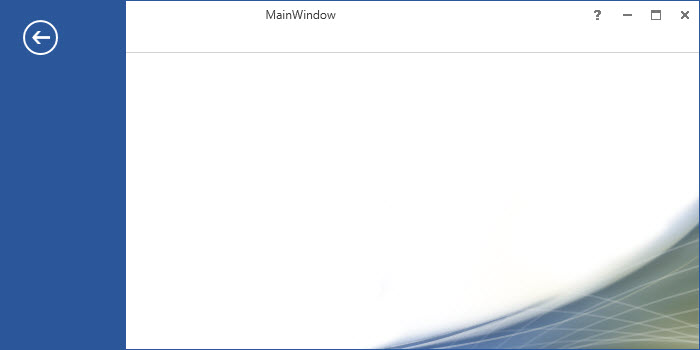
Add application menu
An Application Menu contains standard commands that are performed like in Microsoft Outlook 2003 UI. Using the ApplicationMenu property of the Ribbon, this Menu is viewed by added at the top-left corner of the window.
NOTE
Visual style is set to
Defaultfor RibbonWindow in SkinStorage. and BackStage is not applicable whenApplicationMenuis used in Ribbon.
<syncfusion:RibbonWindow
xmlns="http://schemas.microsoft.com/winfx/2006/xaml/presentation"
xmlns:x="http://schemas.microsoft.com/winfx/2006/xaml"
xmlns:syncfusion="http://schemas.syncfusion.com/wpf" x:Class="RibbonControl.MainWindow"
syncfusion:SkinStorage.VisualStyle="Default" >
<Grid>
<syncfusion:Ribbon x:Name="_ribbon" VerticalAlignment="Top">
<syncfusion:RibbonTab Caption="HOME" IsChecked="True">
<syncfusion:RibbonBar Name="New" Width="90" Header="New">
<syncfusion:RibbonButton SizeForm="Large" Label="New Email"/>
<syncfusion:DropDownButton SizeForm="Large" Label="New Items">
<syncfusion:DropDownMenuItem Header="E-mail Message"/>
<syncfusion:DropDownMenuItem Header="Appointment"/>
<syncfusion:DropDownMenuItem Header="Meeting"/>
<syncfusion:DropDownMenuItem Header="Contact"/>
<syncfusion:DropDownMenuItem Header="Task"/>
</syncfusion:DropDownButton>
</syncfusion:RibbonBar>
<syncfusion:RibbonBar Name="Delete" Width="130" Header="Delete">
<syncfusion:RibbonButton Label="Ignore"/>
<syncfusion:SplitButton Label="Clean Up">
<syncfusion:DropDownMenuItem Header="Clean Up Folder"/>
<syncfusion:DropDownMenuItem Header="Clean Up Conversation"/>
<syncfusion:DropDownMenuItem Header="Clean Up Folder/SubFolder"/>
</syncfusion:SplitButton>
<syncfusion:SplitButton Label="Junk" Margin="0,0,12,0" Width="76"/>
<syncfusion:RibbonButton Label="Delete" SizeForm="Large"/>
</syncfusion:RibbonBar>
<syncfusion:RibbonBar Name="Respond" Width="200" Header="Respond">
<syncfusion:RibbonButton Label="Reply" SizeForm="Large"/>
<syncfusion:RibbonButton Label="Reply All" SizeForm="Large"/>
<syncfusion:RibbonButton Label="Forward" SizeForm="Large"/>
<syncfusion:RibbonButton Label="Meeting"/>
<syncfusion:SplitButton Label="IM" Margin="-2,0,6,0" Width="68"/>
<syncfusion:SplitButton Label="More" Margin="-2,0,6,0" Width="68"/>
</syncfusion:RibbonBar>
<syncfusion:RibbonBar Width="170" Name="QuickSteps" Header="Quick Steps">
<syncfusion:RibbonGallery Width="160" VisualMode="InRibbon" ItemHeight="30" ItemWidth="70">
<syncfusion:RibbonGalleryItem Content="Move to?"/>
<syncfusion:RibbonGalleryItem Content="Team Email"/>
<syncfusion:RibbonGalleryItem Content="ReplyDelete"/>
<syncfusion:RibbonGalleryItem Content="To Manager"/>
<syncfusion:RibbonGalleryItem Content="Done"/>
<syncfusion:RibbonGalleryItem Content="Create New"/>
</syncfusion:RibbonGallery>
</syncfusion:RibbonBar>
<syncfusion:RibbonBar Width="170" Header="Find" Name="Find" >
<syncfusion:RibbonComboBox Label="Filter Email" Width="160">
<ComboBoxItem>[email protected]</ComboBoxItem>
<ComboBoxItem>[email protected]</ComboBoxItem>
<ComboBoxItem>[email protected]</ComboBoxItem>
</syncfusion:RibbonComboBox>
</syncfusion:RibbonBar>
</syncfusion:RibbonTab>
<syncfusion:RibbonTab Caption="SEND/RCEIVE" IsChecked="False"/>
<syncfusion:RibbonTab Caption="FOLDER" IsChecked="False"/>
<syncfusion:RibbonTab Caption="VIEW" IsChecked="False"/>
<syncfusion:Ribbon.QuickAccessToolBar>
<syncfusion:QuickAccessToolBar>
<syncfusion:RibbonButton SizeForm="ExtraSmall"/>
<syncfusion:RibbonButton SizeForm="ExtraSmall" />
<syncfusion:QuickAccessToolBar.QATMenuItems>
<syncfusion:RibbonButton Label="Send" />
<syncfusion:RibbonButton Label="Forward" />
<syncfusion:RibbonButton Label="ReplyAll" />
<syncfusion:RibbonButton Label="Delete" />
<syncfusion:RibbonButton Label="Print" />
</syncfusion:QuickAccessToolBar.QATMenuItems>
</syncfusion:QuickAccessToolBar>
</syncfusion:Ribbon.QuickAccessToolBar>
<syncfusion:Ribbon.ApplicationMenu>
<syncfusion:ApplicationMenu Name="_applicationMenu" Width="38" Height="38" syncfusion:Ribbon.KeyTip="F" IsPopupOpen="False" ApplicationButtonImage="syncfusion.png">
</syncfusion:ApplicationMenu>
</syncfusion:Ribbon.ApplicationMenu>
</syncfusion:Ribbon>
</Grid>
</syncfusion:RibbonWindow>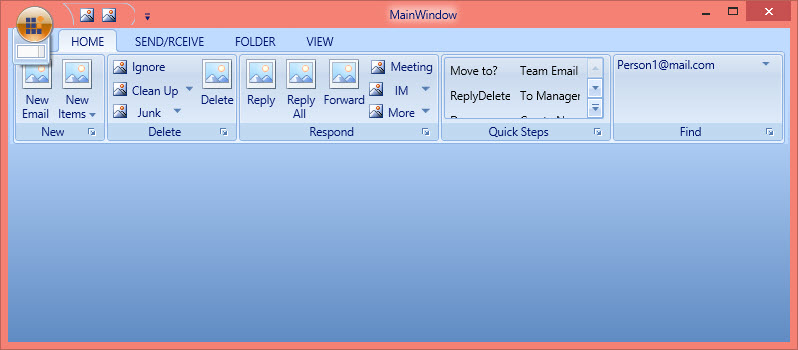
Add application items to the application menu
ApplicationItems are displayed in bottom of the Application menu. Different ApplicationItems are added to an application menu using its ApplicationItems property. Here two RibbonButton with its Label property as “Options” and “Exits” are added as ApplicationMenuItems.
<syncfusion:RibbonWindow
xmlns="http://schemas.microsoft.com/winfx/2006/xaml/presentation"
xmlns:x="http://schemas.microsoft.com/winfx/2006/xaml"
xmlns:syncfusion="http://schemas.syncfusion.com/wpf" x:Class="RibbonControl.MainWindow"
syncfusion:SkinStorage.VisualStyle="Default"
>
<Grid>
<syncfusion:Ribbon x:Name="_ribbon" VerticalAlignment="Top">
<syncfusion:RibbonTab Caption="HOME" IsChecked="True">
<syncfusion:RibbonBar Name="New" Width="90" Header="New">
<syncfusion:RibbonButton SizeForm="Large" Label="New Email"/>
<syncfusion:DropDownButton SizeForm="Large" Label="New Items">
<syncfusion:DropDownMenuItem Header="E-mail Message"/>
<syncfusion:DropDownMenuItem Header="Appointment"/>
<syncfusion:DropDownMenuItem Header="Meeting"/>
<syncfusion:DropDownMenuItem Header="Contact"/>
<syncfusion:DropDownMenuItem Header="Task"/>
</syncfusion:DropDownButton>
</syncfusion:RibbonBar>
<syncfusion:RibbonBar Name="Delete" Width="130" Header="Delete">
<syncfusion:RibbonButton Label="Ignore"/>
<syncfusion:SplitButton Label="Clean Up">
<syncfusion:DropDownMenuItem Header="Clean Up Folder"/>
<syncfusion:DropDownMenuItem Header="Clean Up Conversation"/>
<syncfusion:DropDownMenuItem Header="Clean Up Folder/SubFolder"/>
</syncfusion:SplitButton>
<syncfusion:SplitButton Label="Junk" Margin="0,0,12,0" Width="76"/>
<syncfusion:RibbonButton Label="Delete" SizeForm="Large"/>
</syncfusion:RibbonBar>
<syncfusion:RibbonBar Name="Respond" Width="200" Header="Respond">
<syncfusion:RibbonButton Label="Reply" SizeForm="Large"/>
<syncfusion:RibbonButton Label="Reply All" SizeForm="Large"/>
<syncfusion:RibbonButton Label="Forward" SizeForm="Large"/>
<syncfusion:RibbonButton Label="Meeting"/>
<syncfusion:SplitButton Label="IM" Margin="-2,0,6,0" Width="68"/>
<syncfusion:SplitButton Label="More" Margin="-2,0,6,0" Width="68"/>
</syncfusion:RibbonBar>
<syncfusion:RibbonBar Width="170" Name="QuickSteps" Header="Quick Steps">
<syncfusion:RibbonGallery Width="160" VisualMode="InRibbon" ItemHeight="30" ItemWidth="70">
<syncfusion:RibbonGalleryItem Content="Move to?"/>
<syncfusion:RibbonGalleryItem Content="Team Email"/>
<syncfusion:RibbonGalleryItem Content="ReplyDelete"/>
<syncfusion:RibbonGalleryItem Content="To Manager"/>
<syncfusion:RibbonGalleryItem Content="Done"/>
<syncfusion:RibbonGalleryItem Content="Create New"/>
</syncfusion:RibbonGallery>
</syncfusion:RibbonBar>
<syncfusion:RibbonBar Width="170" Header="Find" Name="Find" >
<syncfusion:RibbonComboBox Label="Filter Email" Width="160">
<ComboBoxItem>[email protected]</ComboBoxItem>
<ComboBoxItem>[email protected]</ComboBoxItem>
<ComboBoxItem>[email protected]</ComboBoxItem>
</syncfusion:RibbonComboBox>
</syncfusion:RibbonBar>
</syncfusion:RibbonTab>
<syncfusion:RibbonTab Caption="SEND/RCEIVE" IsChecked="False"/>
<syncfusion:RibbonTab Caption="FOLDER" IsChecked="False"/>
<syncfusion:RibbonTab Caption="VIEW" IsChecked="False"/>
<syncfusion:Ribbon.QuickAccessToolBar>
<syncfusion:QuickAccessToolBar>
<syncfusion:RibbonButton SizeForm="ExtraSmall"/>
<syncfusion:RibbonButton SizeForm="ExtraSmall" />
<syncfusion:QuickAccessToolBar.QATMenuItems>
<syncfusion:RibbonButton Label="Send" />
<syncfusion:RibbonButton Label="Forward" />
<syncfusion:RibbonButton Label="ReplyAll" />
<syncfusion:RibbonButton Label="Delete" />
<syncfusion:RibbonButton Label="Print" />
</syncfusion:QuickAccessToolBar.QATMenuItems>
</syncfusion:QuickAccessToolBar>
</syncfusion:Ribbon.QuickAccessToolBar>
<syncfusion:Ribbon.ApplicationMenu>
<syncfusion:ApplicationMenu Name="_applicationMenu" Width="38" Height="38" syncfusion:Ribbon.KeyTip="F" IsPopupOpen="False" ApplicationButtonImage="syncfusion.png">
<syncfusion:SimpleMenuButton Label="File" Icon="Document32.png"/>
<syncfusion:ApplicationMenu.MenuItems>
<syncfusion:SimpleMenuButton Label="New" Icon="Document32.png"/>
<syncfusion:SimpleMenuButton Label="Open" Icon="Open32.png" />
</syncfusion:ApplicationMenu.MenuItems>
<syncfusion:ApplicationMenu.ApplicationItems>
<syncfusion:RibbonButton SizeForm = "Small" Label="Options" SmallIcon="Options.png"/>
<syncfusion:RibbonButton SizeForm = "Small" Label="Exit" SmallIcon="Exit.png"/>
</syncfusion:ApplicationMenu.ApplicationItems>
</syncfusion:ApplicationMenu>
</syncfusion:Ribbon.ApplicationMenu>
</syncfusion:Ribbon>
</Grid>
</syncfusion:RibbonWindow>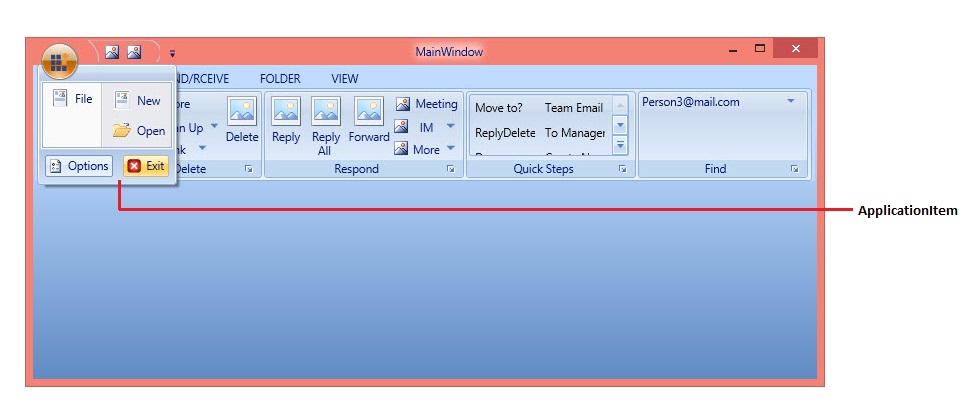
Adding custom controls to the title bar
The RibbonWindow allows to load any custom controls into the right side of the title bar by using both HeaderItems and HeaderItemsSource property.
Adding items using HeaderItems
The HeaderItems property of the RibbonWindow allows you to load any controls directly into the title bar.
<syncfusion:RibbonWindow x:Class="CustomControl.MainWindow"
xmlns="http://schemas.microsoft.com/winfx/2006/xaml/presentation"
xmlns:x="http://schemas.microsoft.com/winfx/2006/xaml"
xmlns:d="http://schemas.microsoft.com/expression/blend/2008"
xmlns:mc="http://schemas.openxmlformats.org/markup-compatibility/2006"
xmlns:local="clr-namespace:CustomControl"
xmlns:syncfusion="http://schemas.syncfusion.com/wpf"
xmlns:skin="clr-namespace:Syncfusion.SfSkinManager;assembly=Syncfusion.SfSkinManager.WPF"
skin:SfSkinManager.Theme="{skin:SkinManagerExtension ThemeName=FluentLight}"
mc:Ignorable="d"
Title="CustomControl in the TitleBar"
Height="450" Width="800"
IsGlassActive="False"
WindowStartupLocation="CenterScreen"
WindowState="Normal">
<syncfusion:RibbonWindow.Resources>
<DataTemplate x:Key="icontemplate">
<Grid>
<Path Data="M26.199951,12.300006L28.399963,12.300006 28.399963,15.899998 32,15.899998 32,18.000004 28.399963,18.000004 28.399963,21.600012 26.199951,21.600012 26.199951,18.000004 22.599976,18.000004 22.599976,15.800007 26.199951,15.800007z M14.799988,0C18.599976,-7.6615834E-08 21.699951,3.8000038 21.699951,8.6000081 21.699951,12.500003 19.699951,15.399998 17,16.800007 16.599976,16.899998 16,17.399998 16,18.000004 16,18.500004 16.599976,19.000004 16.899963,19.10001 22.599976,21.100012 27.5,23.9 29.5,29.400002L0,29.400002C2,23.800009 6.8999634,21.300009 12.599976,19.10001 12.899963,19.000004 13.399963,18.500004 13.399963,18.000004 13.399963,17.500004 12.899963,17.000004 12.599976,16.899998 9.7999878,15.399998 7.8999634,12.600009 7.8999634,8.6000081 7.7999878,3.8000038 10.899963,-7.6615834E-08 14.799988,0z" Stretch="Uniform" Fill="{Binding RelativeSource={RelativeSource Mode=Self}, Path=(TextBlock.Foreground)}" Width="16" Height="16" Margin="0,0,0,0" RenderTransformOrigin="0.5,0.5">
<Path.RenderTransform>
<TransformGroup>
<TransformGroup.Children>
<RotateTransform Angle="0" />
<ScaleTransform ScaleX="1" ScaleY="1" />
</TransformGroup.Children>
</TransformGroup>
</Path.RenderTransform>
</Path>
</Grid>
</DataTemplate>
</syncfusion:RibbonWindow.Resources>
<syncfusion:RibbonWindow.HeaderItems>
<syncfusion:ButtonAdv x:Name="headerItem" Height="25" Label="Sign-In" SizeMode="Normal" IconTemplate="{StaticResource icontemplate}" />
</syncfusion:RibbonWindow.HeaderItems>
<Grid>
<syncfusion:Ribbon x:Name="ribbon" VerticalAlignment="Top">
<syncfusion:RibbonTab Caption="HOME" IsChecked="True"/>
<syncfusion:RibbonTab Caption="SEND/RCEIVE" IsChecked="False"/>
<syncfusion:RibbonTab Caption="FOLDER" IsChecked="False"/>
</syncfusion:Ribbon>
</Grid>
</syncfusion:RibbonWindow>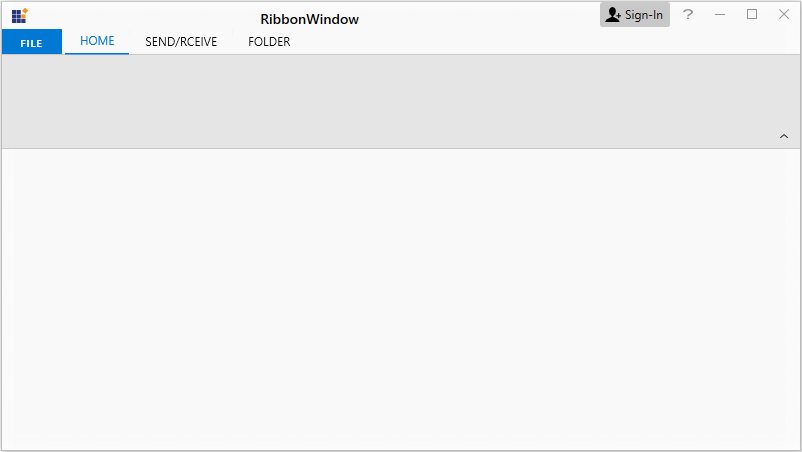
Adding items using HeaderItemsSource
The HeaderItemsSource property of the RibbonWindow allows you to bind a collection of objects which used to load custom controls into the right side of the title bar.
<syncfusion:RibbonWindow x:Class="CustomControl.MainWindow"
xmlns="http://schemas.microsoft.com/winfx/2006/xaml/presentation"
xmlns:x="http://schemas.microsoft.com/winfx/2006/xaml"
xmlns:d="http://schemas.microsoft.com/expression/blend/2008"
xmlns:mc="http://schemas.openxmlformats.org/markup-compatibility/2006"
xmlns:local="clr-namespace:CustomControl"
xmlns:syncfusion="http://schemas.syncfusion.com/wpf"
xmlns:skin="clr-namespace:Syncfusion.SfSkinManager;assembly=Syncfusion.SfSkinManager.WPF"
skin:SfSkinManager.Theme="{skin:SkinManagerExtension ThemeName=FluentLight}"
xmlns:listCollection="clr-namespace:System.Collections;assembly=mscorlib"
mc:Ignorable="d"
Title="RibbonWindow"
Height="450" Width="800"
IsGlassActive="False"
WindowStartupLocation="CenterScreen"
WindowState="Normal">
<syncfusion:RibbonWindow.Resources>
<DataTemplate x:Key="icontemplate">
<Grid>
<Path Data="M26.199951,12.300006L28.399963,12.300006 28.399963,15.899998 32,15.899998 32,18.000004 28.399963,18.000004 28.399963,21.600012 26.199951,21.600012 26.199951,18.000004 22.599976,18.000004 22.599976,15.800007 26.199951,15.800007z M14.799988,0C18.599976,-7.6615834E-08 21.699951,3.8000038 21.699951,8.6000081 21.699951,12.500003 19.699951,15.399998 17,16.800007 16.599976,16.899998 16,17.399998 16,18.000004 16,18.500004 16.599976,19.000004 16.899963,19.10001 22.599976,21.100012 27.5,23.9 29.5,29.400002L0,29.400002C2,23.800009 6.8999634,21.300009 12.599976,19.10001 12.899963,19.000004 13.399963,18.500004 13.399963,18.000004 13.399963,17.500004 12.899963,17.000004 12.599976,16.899998 9.7999878,15.399998 7.8999634,12.600009 7.8999634,8.6000081 7.7999878,3.8000038 10.899963,-7.6615834E-08 14.799988,0z" Stretch="Uniform" Fill="{Binding RelativeSource={RelativeSource Mode=Self}, Path=(TextBlock.Foreground)}" Width="16" Height="16" Margin="0,0,0,0" RenderTransformOrigin="0.5,0.5">
<Path.RenderTransform>
<TransformGroup>
<TransformGroup.Children>
<RotateTransform Angle="0" />
<ScaleTransform ScaleX="1" ScaleY="1" />
</TransformGroup.Children>
</TransformGroup>
</Path.RenderTransform>
</Path>
</Grid>
</DataTemplate>
</syncfusion:RibbonWindow.Resources>
<syncfusion:RibbonWindow.HeaderItemsSource>
<listCollection:ArrayList>
<TextBox x:Name="textBox" Text="Search" Width="100"/>
<syncfusion:ButtonAdv x:Name="headerItem" Height="25" Margin="25,0,0,0" Label="Sign-In" SizeMode="Normal" IconTemplate="{StaticResource icontemplate}" />
</listCollection:ArrayList>
</syncfusion:RibbonWindow.HeaderItemsSource>
<Grid>
<syncfusion:Ribbon x:Name="ribbon" VerticalAlignment="Top">
<syncfusion:RibbonTab Caption="HOME" IsChecked="True"/>
<syncfusion:RibbonTab Caption="SEND/RCEIVE" IsChecked="False"/>
<syncfusion:RibbonTab Caption="FOLDER" IsChecked="False"/>
</syncfusion:Ribbon>
</Grid>
</syncfusion:RibbonWindow>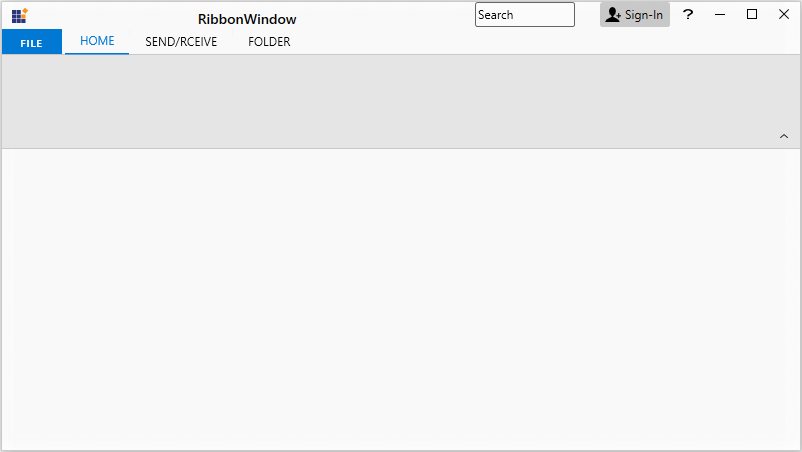
Setting HeaderItemTemplate
The RibbonWindow allows you to customize the visual appearance of the custom items stored in the HeaderItemsSource using HeaderItemTemplate property.
<syncfusion:RibbonWindow x:Class="CustomControl.MainWindow"
xmlns="http://schemas.microsoft.com/winfx/2006/xaml/presentation"
xmlns:x="http://schemas.microsoft.com/winfx/2006/xaml"
xmlns:d="http://schemas.microsoft.com/expression/blend/2008"
xmlns:mc="http://schemas.openxmlformats.org/markup-compatibility/2006"
xmlns:local="clr-namespace:CustomControl"
xmlns:syncfusion="http://schemas.syncfusion.com/wpf"
xmlns:skin="clr-namespace:Syncfusion.SfSkinManager;assembly=Syncfusion.SfSkinManager.WPF"
skin:SfSkinManager.Theme="{skin:SkinManagerExtension ThemeName=FluentLight}"
xmlns:listCollection="clr-namespace:System.Collections;assembly=mscorlib"
xmlns:system="clr-namespace:System;assembly=mscorlib"
mc:Ignorable="d"
Title="RibbonWindow"
Height="450" Width="800"
IsGlassActive="False"
WindowStartupLocation="CenterScreen"
WindowState="Normal">
<syncfusion:RibbonWindow.HeaderItemTemplate>
<DataTemplate>
<Grid>
<Border Margin="1" Width="60" Height="22" Background="Blue">
<TextBlock Foreground="Yellow" Text="{Binding}" TextAlignment="Center" />
</Border>
</Grid>
</DataTemplate>
</syncfusion:RibbonWindow.HeaderItemTemplate>
<syncfusion:RibbonWindow.HeaderItemsSource>
<listCollection:ArrayList>
<system:String>Search</system:String>
<system:String>Sign-In</system:String>
</listCollection:ArrayList>
</syncfusion:RibbonWindow.HeaderItemsSource>
<Grid>
<syncfusion:Ribbon x:Name="ribbon" VerticalAlignment="Top">
<syncfusion:RibbonTab Caption="HOME" IsChecked="True"/>
<syncfusion:RibbonTab Caption="SEND/RCEIVE" IsChecked="False"/>
<syncfusion:RibbonTab Caption="FOLDER" IsChecked="False"/>
</syncfusion:Ribbon>
</Grid>
</syncfusion:RibbonWindow>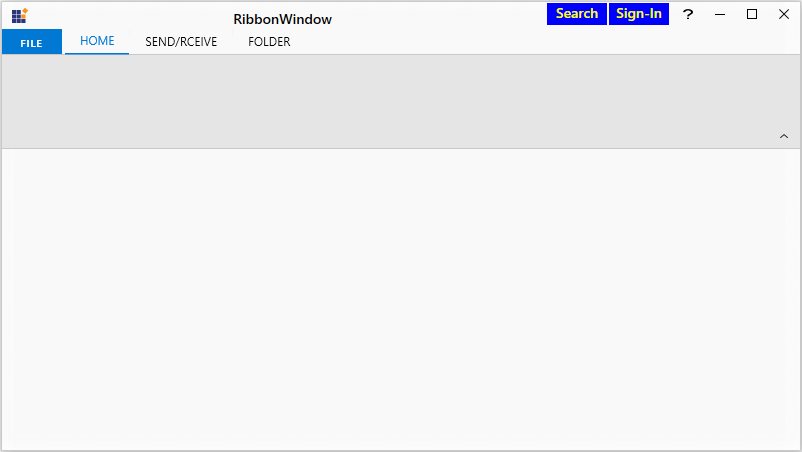
Setting HeaderItemTemplateSelector
The RibbonWindow allows you to customize the visual appearance of each item with different templates based on specific constraints by using the HeaderItemTemplateSelector.
<syncfusion:RibbonWindow x:Class="CustomControl.MainWindow"
xmlns="http://schemas.microsoft.com/winfx/2006/xaml/presentation"
xmlns:x="http://schemas.microsoft.com/winfx/2006/xaml"
xmlns:d="http://schemas.microsoft.com/expression/blend/2008"
xmlns:mc="http://schemas.openxmlformats.org/markup-compatibility/2006"
xmlns:local="clr-namespace:CustomControl"
xmlns:syncfusion="http://schemas.syncfusion.com/wpf"
xmlns:skin="clr-namespace:Syncfusion.SfSkinManager;assembly=Syncfusion.SfSkinManager.WPF"
skin:SfSkinManager.Theme="{skin:SkinManagerExtension ThemeName=FluentLight}"
xmlns:listCollection="clr-namespace:System.Collections;assembly=mscorlib"
xmlns:system="clr-namespace:System;assembly=mscorlib"
mc:Ignorable="d"
Title="RibbonWindow"
Height="450" Width="800"
IsGlassActive="False"
WindowStartupLocation="CenterScreen"
WindowState="Normal">
<syncfusion:RibbonWindow.Resources>
<DataTemplate x:Key="BlueBorderTemplate" >
<Border Margin="1" Width="60" Height="22" Background="Blue">
<TextBlock Foreground="Yellow" Text="{Binding}" TextAlignment="Center" />
</Border>
</DataTemplate>
<DataTemplate x:Key="OrangeBorderTemplate">
<Border Margin="1" Width="60" Height="22" Background="Orange">
<TextBlock Foreground="Green" Text="{Binding}" TextAlignment="Center" />
</Border>
</DataTemplate>
</syncfusion:RibbonWindow.Resources>
<syncfusion:RibbonWindow.HeaderItemTemplateSelector>
<local:ItemTemplateSelector/>
</syncfusion:RibbonWindow.HeaderItemTemplateSelector>
<syncfusion:RibbonWindow.HeaderItemsSource>
<listCollection:ArrayList>
<system:String>Search</system:String>
<system:String>Sign-In</system:String>
</listCollection:ArrayList>
</syncfusion:RibbonWindow.HeaderItemsSource>
<Grid>
<syncfusion:Ribbon x:Name="ribbon" VerticalAlignment="Top">
<syncfusion:RibbonTab Caption="HOME" IsChecked="True"/>
<syncfusion:RibbonTab Caption="SEND/RCEIVE" IsChecked="False"/>
<syncfusion:RibbonTab Caption="FOLDER" IsChecked="False"/>
</syncfusion:Ribbon>
</Grid>
</syncfusion:RibbonWindow>public class ItemTemplateSelector : DataTemplateSelector
{
public override DataTemplate SelectTemplate(object item, DependencyObject container)
{
if (item.ToString() == "Search")
{
return (container as FrameworkElement).TryFindResource("BlueBorderTemplate") as DataTemplate;
}
if (item.ToString() == "Sign-In")
{
return (container as FrameworkElement).TryFindResource("OrangeBorderTemplate") as DataTemplate;
}
return base.SelectTemplate(item, container);
}
}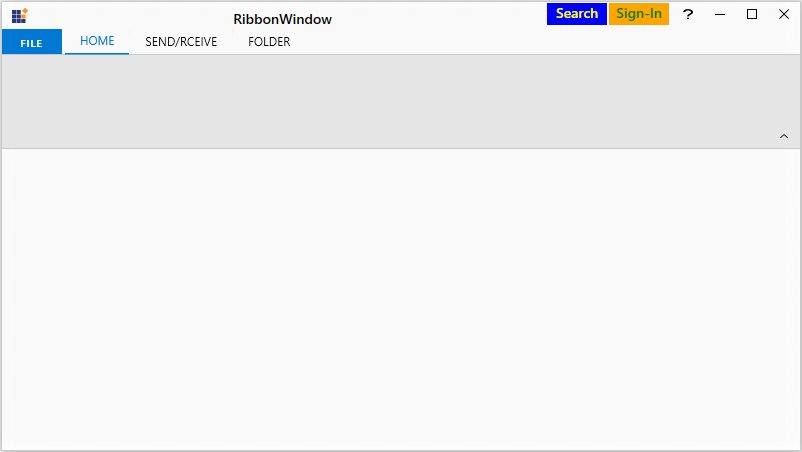
NOTE
Set simplified layout
The simplified layout is designed to display the most commonly used Ribbon commands in a single line interface, allowing more screen space for compact content viewing, while other commands are placed inside the overflow menu. To know more about the simplified layout, refer here.
Theme
Ribbon supports various built-in themes. Refer to the below links to apply themes for the Ribbon,
